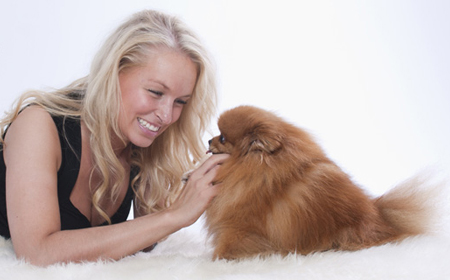 When picturing chemotherapy for human patients, many people see images of hair loss and extended sickness.
When picturing chemotherapy for human patients, many people see images of hair loss and extended sickness.
The good news is that for dogs this is generally not the case. Given the low dose chemotherapy treatments used for Canine Lymphoma, dogs can generally tolerate these treatments quite well with only minimal side effects.
Most dogs will not lose their hair (because they have fur!). Fur grows differently than hair, and does not fall out the way hair does. Your dog may shed more than normal, especially in the heat of summer. However, if you have a dog with hair, such as a poodle, these breeds will lose a large amount of their hair.
And while the treatments may make your dog tired or have a decreased appetite for a day or two, full blown side effects are rare, and generally manageable.
Dr. Freeman estimates that maybe 20% of her patients experience significant side effects while being treated with chemotherapy. And in the vast majority of Canine Lymphoma cases, her patients handle the treatments quite well, to the extent that the dog’s caregivers and friends don’t even realize that the dog is sick.
More About Canine Lymphoma Chemotherapy Side Effects
Mild Canine Lymphoma Chemotherapy Side Effects
The types of mild side effects that Canine Lymphoma patients can expect as a result of their chemotherapy care include:
- Decreased Activity Level (Tired and Lethargic);
- Loss of Appetite;
- Some Nausea;
- Vomiting;
- Diarrhea;
- Some fever because their white count is low and they’ve got an infection;
- Etc.
But again, these side effects are rare and most of these side effects may last only for a few days.
More Significant Canine Lymphoma Chemotherapy Side Effects
While more significant side effects are possible, only a very small percentage of dogs require hospitalization for the side effects of there conventional chemotherapy care.
The number of patients that Dr. Freeman has to hospitalize each year, are just a handful, out of maybe 500 to 1,000 patients that she treats each year.
In addition, in cases where side effects are likely, your vet may be able to adjust the dosages or provide certain medicines that can counteract the side effects to make the process easier for your dog.
Always be sure to let your vet know if your dog is undergoing any side effects from any Canine Lymphoma chemotherapy treatment, so he or she can make adjustments or prescribe other methods to make your dog more comfortable through the process.
If a dog is treated with Chemotherapy on Monday, then the general cycle is for them to feel fine on Monday and Tuesday, and then they start experience some weakness on Wednesday and Thursday, and then they’re fine again until they’re ready for their next chemotherapy treatment.
For some of the chemotherapy drugs used in conventional canine lymphoma care, the risk of side effects is small, so the vet may not worry about it too much. But for certain chemotherapy treatments where the risk of side effects are more significant, vets may prescribe anti-nausea or anti-diarrhea drugs to counteract those potential side effects.
Holisitic Remedies to Minimize Canine Lymphoma Chemotherapy Side Effects
Even though most dogs are able to tolerate chemotherapy treatments for their Canine Lymphoma well on their own, many vets find that certain natural supplements can boost your dog’s health and strength during the chemotherapy process, and minimize any chemotherapy side effects.
- Previous Article – Chemotherapy – Rescue Protocols
- Next Article – Canine Lymphoma Prednisone
For more free Canine Lymphoma information, downloads and support - and
for help with your dog’s cancer care – visit our sister Charity website
"The Dog Cancer Tribe" at www.DogCancerTribe.com
Note: The information on this website is intended for research and informational purposes only. It is not to be used to diagnose or treat any disease, and should not be used as a substitute for proper veterinary consultation and care. Every dog and every cancer case is different, so if you fear that your dog has Canine Lymphoma, we encourage you to seek appropriate professional veterinary care as quickly as possible to determine the best course of action to treat your dog and his or her particular circumstances.
———————
| (c) 2021 - CanineLymphoma.com | Privacy Policy | Terms and Conditions | Sitemap |





